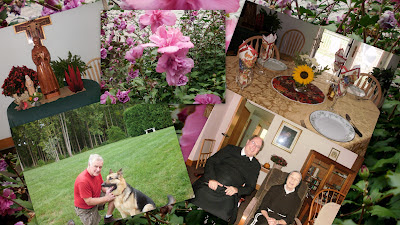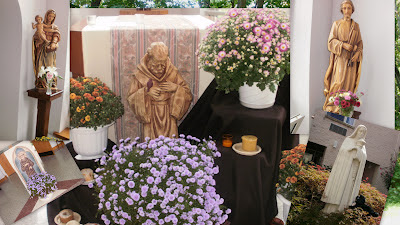Our dear Sister Natalie celebrated her 95th birthday October 6th.
We had a wonderful Mass with Father Steve Schuler SVD and a delicious dinner prepared by Sister Nelia and Karen.
The dinner was followed by a prayer service arranged by Sister Mary Frances and after this Sister Natalie opened her gifts from each Sister.
As you can see from the pictures Sister Natalie loves to read and some of the gifts included about four books.
Congratulations, Sister Natalie from your Poor Sisters.
Tonight we are having a party and live entertainment which should give Sister Natalie a good laugh.
Peace
Posted by Sister Florence Vales OSC
Sister Natalie Hayes Celebrated a Milestone- 95 Years Young
October 4th Feast of Saint Francis-
Thoughts on Saint Francis of Assisi From G.K.Chesterton

” only one incident out of a life of such incidents; and 1 have selected it partly because it shows what is meant here by that shadow of gesture there is in all his words, the dramatic gesture of the south; and partly because its special reference to courtesy covers the next fact to be noted. The popular instinct of Saint Francis, and his perpetual preoccupation with the idea of brotherhood, will be entirely misunderstood if it is understood in the sense of what is often called camaraderie; the backslapping sort of brotherhood. Frequently from the enemies and too frequently from the friends of the democratic ideal, there has come a notion that this note is necessary to that ideal. It is assumed that equality means all men being equally uncivil, whereas it obviously ought to mean all men being equally civil. Such people have forgotten the very meaning and derivation of the word civility, if they do not see that to be uncivil is to be uncivic. But anyhow that was not the equality which Francis of Assisi encouraged; but an equality of the opposite kind; it was a camaraderie actually founded on courtesy.
Even in that fairy borderland of his mere fancies about flowers and animals and even inanimate things, he retained this permanent posture of a sort of deference. A friend of mine said that somebody was the sort of man who apologises to the cat. Saint Francis really would have apologised to the cat. When he was about to preach in a wood full of the chatter of birds, he said, with a gentle gesture, “Little sisters, if you have now had your say, it is time that I also should be heard.” And all the birds were silent; as I for one can very easily believe. In deference to my special design of making matters intelligible to average modernity, I have treated separately the subject of the miraculous powers that Saint Francis most certainly possessed.
But even apart from any miraculous powers, men of that magnetic sort, with that intense interest in animals, often have an extraordinary power over them. Saint Francis’s power was always exercised with this elaborate politeness. Much of it was doubtless a sort of symbolic joke, a pious pantomime intended to convey the vital distinction in his divine mission, that he not only loved but reverenced God in all his creatures. In this sense he had the air not only of apologising to the cat or to the birds, but of apologising to a chair for sitting on it or to a table for sitting down at it. Any one who had followed him through life merely to laugh at him, as a sort of lovable lunatic, might easily have had an impression as of a lunatic who bowed to every post or took off his hat to every tree. This was all a part of his instinct for imaginative gesture. He taught the world a large part of its lesson by a sort of divine dumb alphabet. But if there was this ceremonial element even in lighter or lesser matters, its significance became far more serious in the serious work of his life, which was an appeal to humanity, or rather to human beings.
I have said that Saint Francis deliberately did not see the wood for the trees. It is even more true that he deliberately did not see the mob for the men. What distinguishes this very genuine democrat from any mere demagogue is that he never either deceived or was deceived by the illusion of mass-suggestion. Whatever his taste in monsters, he never saw before him a many-headed beast. He only saw the image of God multiplied but never monotonous. To him a man was always a man and did not disappear in a dense crowd any more than in a desert. He honoured all men; that is, he not only loved but respected them all. What gave him his extraordinary personal power was this; that from the Pope to the beggar, from the sultan of Syria in his pavilion to the ragged robbers crawling out of the wood, there was never a man who looked into those brown burning eyes without being certain that Francis Bernardone was really interested in him; in his own inner individual life from the cradle to the grave; that he himself was being valued and taken seriously, and not merely added to the spoils of some social policy or the names in some clerical document. Now for this particular moral and religious idea there is no external expression except courtesy. Exhortation does not express it, for it is not mere abstract enthusiasm; beneficence does not express it, for it is not mere pity. It can only be conveyed by a certain grand manner which may be called good manners. We may say if we like that Saint Francis, in the bare and barren simplicity of his life, had clung to one rag of luxury; the manners of a court.
But whereas in a court there is one king and a hundred courtiers, in this story there was one courtier, moving among a hundred kings. For he treated the whole mob of men as a mob of kings. And this was really and truly the only attitude that will appeal to that part of man to which he wished to appeal. It cannot be done by giving gold or even bread; for it is a proverb that any reveller may fling largesse in mere scorn. It cannot even be done by giving time and attention; for any number of philanthropists and benevolent bureaucrats do such work with a scorn far more cold and horrible in their hearts. No plans or proposals or efficient rearrangements will give back to a broken man his self-respect and sense of speaking with an equal. One gesture will do it.
With that gesture Francis of Assisi moved among men; and it was soon found to have something in it of magic and to act, in a double sense, like a charm. But it must always be conceived as a completely natural gesture; for indeed it was almost a gesture of apology. He must be imagined as moving thus swiftly through the world with a sort of impetuous politeness; almost like the movement of a man who stumbles on one knee half in haste and half in obeisance. The eager face under the brown hood was that of a man always going somewhere, as if he followed as well as watched the flight of the birds. And this sense of motion is indeed the meaning of the whole revolution that he made; for the work that has now to be described was of the nature of an earthquake or a volcano, an explosion that drove outwards with dynamic energy the forces stored up by ten centuries in the monastic fortress or arsenal and scattered all its riches recklessly to the ends of the earth. In a better sense than the antithesis commonly conveys, it is true to say that what Saint Benedict had stored Saint Francis scattered; but in the world of spiritual things what had been stored into the barns like grain was scattered over the world as seed. The servants of God who had been a besieged garrison became a marching army; the ways of the world were filled as with thunder with the trampling of their feet and far ahead of that ever swelling host went a man singing; as simply he had sung that morning in the winter woods, where he walked alone.
Posted by Sister Florence Vales OSC
Holy Name Federation Council Members of the Poor Clares
The Holy Name Federation Council Members met at the Monastery of Saint Clare September 21-23.
Left to right:
Sister Nancy of Travelers Rest, SC, Sister Ann of Langhorn, PA , Sister Carolyn of Travelers Rest, SC Sisters Barbara and Etta of Chesterfield, NJ.
All the council members said that the new President, Sister Carolyn, did a fine job and they accomplished very much in the short time that they met.
Feast of Saint Francis – A Man of Peace
Posted by Sister Florence Vales OSC
Vatican City, 25 September 2012 (VIS) – “God, the unknown” is to be the theme of the “Atrium of St. Francis”, an initiative organised by the Pontifical Council for Culture, the Holy Convent of Assisi and the “Oicos Riflessioni” Association. A press conference presenting the event was held this morning in the Holy See Press Office.
The meeting is due to take place in the Italian town of Assisi on 5 and 6 October and is part of the “Courtyard of the Gentiles” project, a structure for permanent dialogue between believers and non believers created by the Pontifical Council for Culture under the presidency of Cardinal Gianfranco Ravasi. The Courtyard of the Gentiles has already organised events in several European capitals.
The Assisi meeting, in which more than forty speakers are due to participate, will be opened by Giorgio Napolitano, president of the Republic of Italy. The programme, which involves nine meetings in nine “atria” at different locations around the city of St. Francis, will cover the following themes: “Work, business and responsibility”, “Contemplation and meditation”, “Inter-cultural and inter-religious dialogue for peace”, “Young people, between faith and nihilism”, “The cry of the earth”, “Art and faith”, “The cry of the poor, the world economic crisis and sustainable development”. Among the participants will be figures from the worlds of culture, science, art and economics, such as film-maker Ermanno Olmi, architect Massimiliano Fuksas, and trade union leader Susanna Camusso.
“In a second edition of his letter to the faithful St. Francis addressed himself to ‘all Christians, religious, clergy and laity, to men and women, to all inhabitants of the world entire'”, notes Fr. Giuseppe Piemontese, custodian of the Holy Convent of Assisi. “We are opening the ‘Atrium of St. Francis’ with great humility, and under the sign of that evangelical openness to others. Our hope is that the Courtyard of the Gentiles, in its call at Assisi, will be able to demonstrate the ‘pure heart’ and ‘pure mind’ to which St. Francis called us”.
Celebrating Sister Frances Vass Incorporation into The Monastery of St. Clare,Chesterfield, NJ , September 18, 2012 , The Feast of St. Joseph of Cupertino
Up Coming Feast of Saint Francis
September is dwindling down to a few weeks before the feast of Saint Francis of Assisi, October 4th.
We take time to reflect on this Saint from the writings of G.K. Chesterton. The following quotes are taken from his book Simplicity and Tolstoy.
Francis expressed in loftier and bolder language than any earthly thinker the conception that laughter is as divine as tears. He never forgot to take pleasure in a bird as it flashed past him or a drop of water as it fell from his finger.
The clear and tranquil life of the Three Vows had a fine and delicate effect on the genius of Francis. He was primarily a poet. The perfection of his literary instinct is shown in his naming fire “Brother” and the water,”Sister” in the quaint appeal in the sermon to the fishes .’that they alone were saved in the Flood.
The general attitude of Saint Francis, like that of his Master, embodied a kind of terrible common-sense. The famous remark of the Caterpillar in”Alice of Wonderland”-“Why not?” impresses us as his general motto.He could not see why he should not be on good terms with all things. The pomp of war and ambition, the great empire of the Middle Ages and all its fellows begin to look tawdry and top-heavy, under the rationality of that innocent stare. His questions were blasting and devastating, like the questions of a child. He would not have been afraid even of the nightmares of cosmogony, for he had no fear in him. To him the world was small, not because he had any views as to its size, but for the reason that gossiping ladies(???) find it small, because so many relatives were to be found in it. If you had taken him to the loneliest star that the madness of an astronomer can conceive, Francis would have only beheld in it the features of a new friend.
Posted by Sister Florence Vales OSC
Patriot’s Day September 11, 2012



May God give him Eternal Rest and be with his loved ones
May the dead intercede for Peace for us here on earth.
Posted by Sister Florence Vales OSC
Saint Francis- Lover of Creation
Meister Eckhart said of Creation “Every creature is a word of God.” Reading Francis and reading Eckhart is a very harmonious experience. Their spirituality is creation-centered that is so biblical.
G.K.Chesterton says of Francis
Francis never forgot to take pleasure in a bird as it flashed past him or a drop of water as it fell from his finger.- Francis could not see why he should not be on good terms with all things.
Posted by Sister Florence Vales OSC




